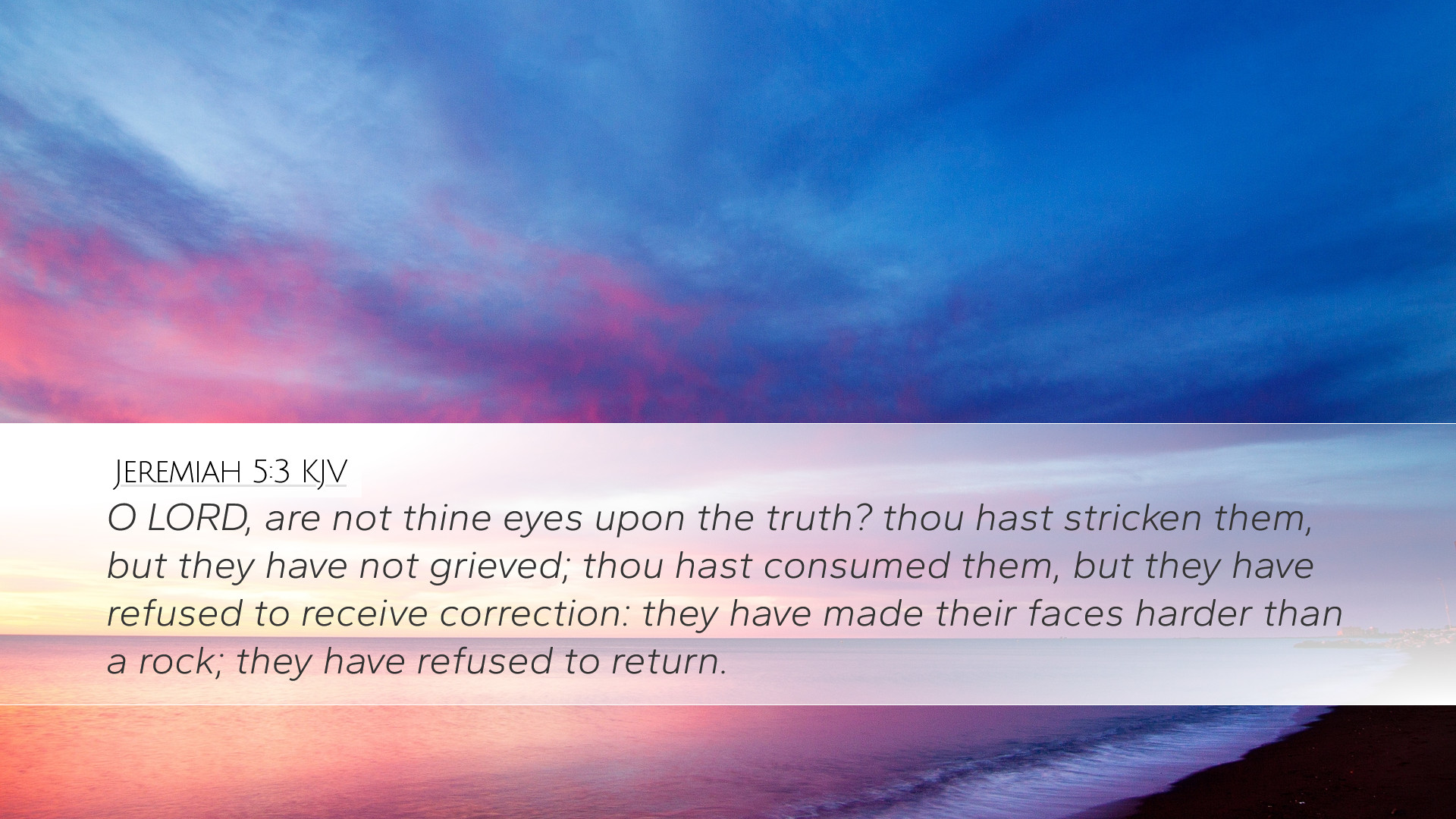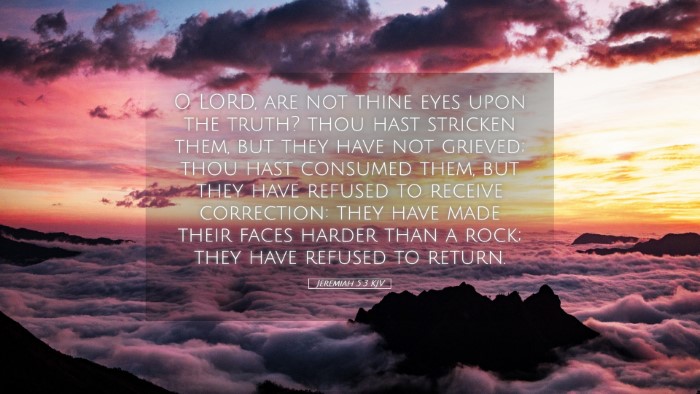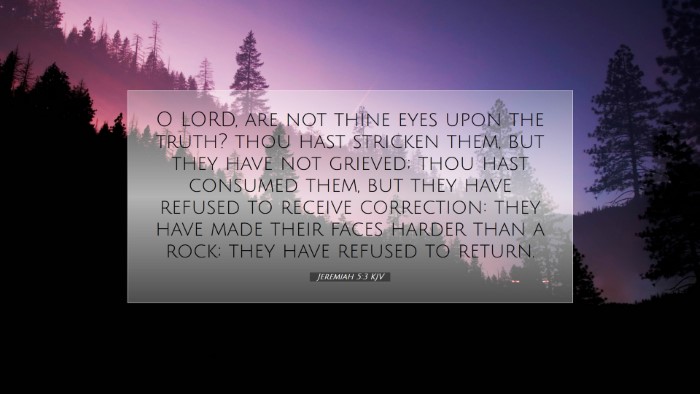Commentary on Jeremiah 5:3
Verse: Jeremiah 5:3 (KJV) - "O Lord, are not thine eyes upon the truth? thou hast stricken them, but they have not grieved; thou hast consumed them, but they have refused to receive correction: they have made their faces harder than a rock; they have refused to return."
Introduction
This verse, a poignant cry from the prophet Jeremiah, encapsulates the essence of Israel's spiritual obstinacy and God’s relentless pursuit of His people. In examining this passage, we draw insights from esteemed public domain commentaries, including those of Matthew Henry, Albert Barnes, and Adam Clarke. Each offers a distinct perspective that is crucial for a comprehensive understanding of the text.
Contextual Background
Jeremiah's Prophetic Context: Jeremiah, known as the weeping prophet, proclaims messages of impending judgment against Judah due to their persistent sin and idolatry. This sadness coupled with the urgency of his message reflects the emotional weight he carries for his people—an aspect that enriches the understanding of Jeremiah 5:3.
Insights from Commentaries
Matthew Henry's Commentary
Matthew Henry highlights the rebellious nature of the people of Judah. He points out that God's scrutiny of Judah's actions is contrasted against their unresponsive hearts. Henry notes:
- God’s omniscient gaze is focused on “the truth,” indicating His desire for His people to embrace honesty and righteousness.
- The phrase “thou hast stricken them” conveys God’s disciplinary actions; these were not punitive but corrective, aimed at leading the people to repentance.
- Despite God's efforts, the people demonstrate a callousness that is described as being “harder than a rock.” This metaphor signifies their deep-seated refusal to heed divine warnings.
Albert Barnes' Notes
Albert Barnes emphasizes the stubbornness of the people's hearts. He elaborates on the dual themes of divine judgment and the purpose of God’s chastisement:
- Barnes explains that “thou hast consumed them” illustrates the consequences of their continued rebellion. God’s judgment has had real effects, yet it has not led to their realization or repentance.
- He underscores the notion of “refused to receive correction,” indicating a deliberate choice to reject God’s correction. This sets a tone of urgency; spiritual edification is always a choice.
- Furthermore, Barnes interprets the imagery of “faces harder than a rock” as indicative of human pride and defiance against divine authority, raising questions about the broader implications of spiritual hardness.
Adam Clarke's Commentary
Adam Clarke provides a detailed exploration of the text's theological implications and its call to salvation:
- Clarke points out that the mention of God’s watchfulness establishes the foundation for accountability among His people. The idea of God’s eyes being “upon the truth” serves as a reminder of His unwavering presence.
- He also delves into the consequences of rejecting divine correction, noting that such refusal often leads to increased desensitization to sin.
- Clarke asserts that the metaphor of hardness relates directly to the moral and spiritual decay of a nation. He challenges readers to reflect on the implications for contemporary society.
Theological Themes
Several significant theological themes emerge from Jeremiah 5:3 that are worth exploring:
- The Nature of God’s Justice: The relentless nature of God’s concern for truth and justice reflects His character. This amplifies the gravity of the people's refusal to respond.
- Human Willfulness: The refusal to accept correction serves as a fundamental aspect of human nature. This theme resonates across biblical narratives, illustrating the struggle between divine intentions and human actions.
- God's Desire for Repentance: God's interventions, whether through chastening or correction, are manifestations of His desire for His people to repent and turn back to Him.
Practical Application for Pastors and Scholars
The implications of Jeremiah 5:3 extend far beyond its immediate context. For pastors and students alike, there are several practical applications to consider:
- Emphasizing God’s Truth: As ministers, there is a critical call to present God’s truth without compromise and to encourage congregants to discern the authenticity of their spiritual condition.
- Addressing Spiritual Hardness: Insights from the hardened hearts of Israel invite modern examination of attitude toward spiritual discipline and correction within congregations.
- Promoting Active Repentance: Church leadership has a profound responsibility to cultivate an atmosphere where repentance is not only encouraged but seen as a vital aspect of spiritual health.
Conclusion
Jeremiah 5:3 serves as a profound reminder of the principles of divine justice, the deep-seated nature of human defiance, and the hope that resides in repentance. Drawing from the combined wisdom of Matthew Henry, Albert Barnes, and Adam Clarke enriches our understanding and invites contemporary readers to engage with the profound truths within Scripture. Each reflection encourages both sincerity and urgency as we approach God’s call for truth in our lives and our communities.


